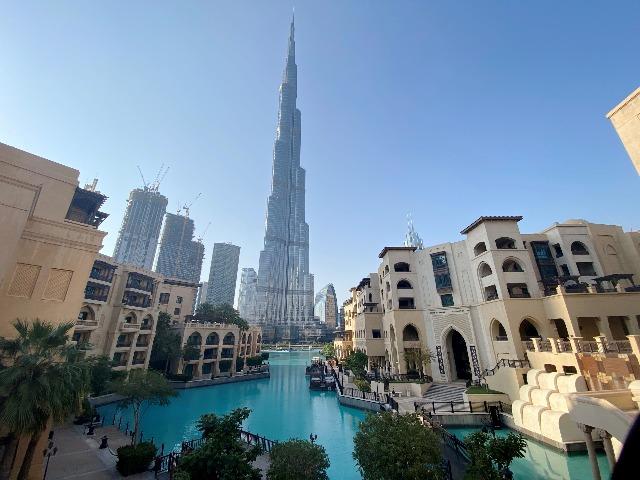OFWs share pitfalls of job hunting in UAE on visit visas

DUBAI, United Arab Emirates – A 26-year-old overseas Filipino worker (OFW), who arrived in Dubai last year to look for work, has decided to go home after failing to secure regular employment and ending up jobless for the past six months due to the COVID-19 pandemic.
Another jobless OFW, who got pregnant and recently gave birth, is now struggling with her husband to raise over Dh16,600 for the hospital bills.
The two OFWs have one thing in common: Both were on visit visas.
“Napuntahan ko na ang lahat ng ayuda,” said Ma. Alianna Marasigan (real name withheld on request), who lives in Satwa, an older part of the city that has become a working class enclave with mostly OFW residents.
“Usually pumipila kami kapag may namimigay ng bigas,” she said, adding that she has not been able to pay for her bedspace in the past months.
“Nakikitira na lang po ako. May kumukupkop po sa akin,” she said.
Marasigan said she has managed to get work, but none of her employers have been able to secure an employment visa for her.
“Puro exit lang talaga ako,” she said.
Exit
By law, visit visa holders need to leave the country once their visa, which has a maximum of three months’ validity, expires. This, so they could apply for a new one while outside the country, usually in neighboring Oman, and extend their stay in the UAE to again try their luck.
They could also opt for a visit visa renewal option that does not require them to exit, considering border conditions as a result of the pandemic, but at higher price range of up to Dh2,500.
Meantime, some, like Marasigan, land a job and get paid, but are not issued employment visa because the employer apparently was not able to apply for it as mandated by law, in which case the three-month stay was just used up.
Marasigan said her last job was as administrative staff at a construction company in Ajman, a neighboring city north of Dubai. But the company downsized with the onset of the pandemic in the UAE, and so her work permit was not processed.
Ameenah
Sharing Marasigan’s ordeal is Ameenah, an OFW who has converted to Islam and has taken on a Muslim name. She has ended up taking her chances in the city on a visit visa after resigning from work last year.
Ameenah, as she preferred to be named in this report, and husband, Ahmad, who is from India, are now in a tight fix. The couple needs to raise Dh16,634 to pay off their hospital bills.
Ameenah’s litany of woes started around February this year, she said, when she became jobless. She arrived on May 25, 2017; quit her job on June 6, 2019 at a logistics company in Jebel Ali, southern Dubai; and got herself a visit visa to extend her stay with hope that she could land a new job – but in vain.
She got married to Ahmad around January this year.
“Last employer ko na ginamit lang ako was sa isang travel agency. Tapos, part-time, part-time na lang ako. Madalas pa, ginagamit lang ng employer yung visa ko. Ang malala pa, minsan ay one month ako nagwo-work tapos di nila ako binabayaran,” said Ameenah.
Ameenah, a single mom of two kids when she left the Philippines for the UAE, said she was “ready” to go underground, but fortunately managed to renew her visit visa for the umpteenth time, and try her luck once again at looking for a job especially now that she has a baby to raise. Her husband has also been unemployed for some time and is currently on training for a new job.
Requirements
By law, tourists in the UAE must first secure a residency visa and work permit from their employers before they could start employment.
Penalties including heavy fines of up to Dh50,000 and deportation are imposed on those caught working on a visit visa, who also are blacklisted from re-entering the UAE; companies employing people on visit visas are likewise heavily fined.
Some employers reportedly allow their employees to work even while on visit visas provided papers are already under process with the government for the issuance of the residency visa and work permit.
Holders of residency visas are allowed to bring relatives to the UAE as visit visa holders, who then themselves start looking for jobs.
Mounting concerns on the alleged abuse of the UAE’s visit visa program by jobseekers and some employers have prompted the Philippine Embassy in Abu Dhabi to recently issue a policy directive requiring OFWs sponsoring relatives to the country to at least be earning Dh10,000 a month. This to ensure they could pay for their relative’s stay.
Repatriation
Early this month, Cortes said the consulate in Dubai has repatriated close to 3,000 Filipinos since the first flight took off in mid-June carrying some 370 OFWs on board Cebu Pacific flight 5J 19. Other subsequent flights were made through the Philippine Airlines.
The latest repatriations were in two batches, which left Dubai International Airport on Aug. 28 and 31 on board Cebu Pacific flight 5J 19 flying a total of 210 OFWs, said Cortes.
He said that up to 40% of this number were OFWs on visit visas, who, like Marasigan, had tried in vain to look for jobs during their stay and did not anymore have money to renew their visas for another three-month period.
He said his office has been organizing another repatriation flight tentatively set for Sept. 24. —KBK, GMA News



